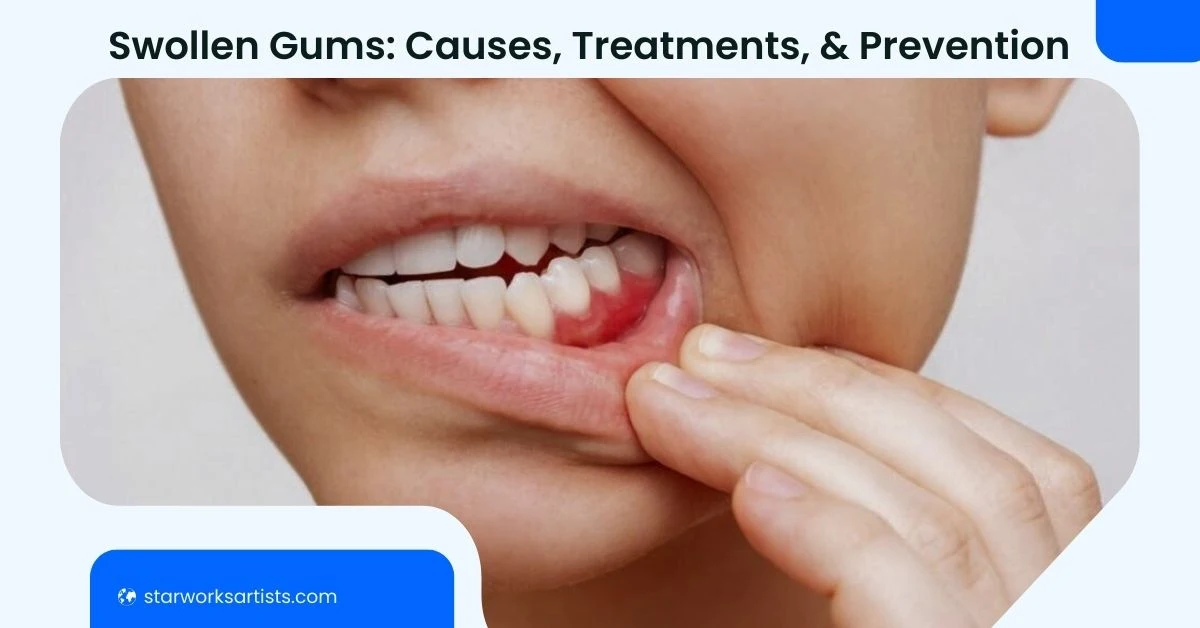Have you heard about Swollen gums? Swollen gums, also known as gingival inflammation, is a common oral health issue that can cause discomfort, sensitivity, and even bleeding. While it may seem like a minor problem, swollen gums can be a sign of an underlying dental condition that requires prompt attention.
In this article, we’ll explore the causes, treatments, and prevention methods for swollen gums, drawing from reputable sources such as the National Institutes of Health (NIH) and the Centers for Disease Control and Prevention (CDC).
Key takeaways:
What Do Swollen Gums Mean?

Swollen gums are a symptom of gingival inflammation, which is often caused by the buildup of plaque and bacteria on the teeth and gums. As the gums become inflamed, they may appear red, swollen, and tender to the touch. In some cases, swollen gums may also bleed during brushing or flossing.
According to the NIH, swollen gums can be a sign of gingivitis, which is the early stage of gum disease. If left untreated, gingivitis can progress to periodontitis, a more severe form of gum disease that can lead to tooth loss and other serious health complications.
What Causes Swollen Gums?
There are several potential causes of swollen gums, including poor oral hygiene, hormonal changes, certain medications, underlying health conditions, improper dental work, and smoking and tobacco use. Poor oral hygiene, and failing to brush and floss regularly, can lead to the accumulation of plaque and bacteria on the teeth and gums, causing inflammation and swelling. Hormonal fluctuations during pregnancy, menstruation, or menopause can also increase the risk of swollen gums and gum disease.
Gum swelling is a side effect of several medications, including immunosuppressants, calcium channel blockers, and anti-seizure treatments. Underlying health conditions like diabetes, HIV/AIDS, and cancer can weaken the immune system and increase the risk of gum inflammation and infection. Ill-fitting dental appliances, such as braces or dentures, can irritate the gums and cause swelling. Additionally, smoking and other forms of tobacco use can increase the risk of gum disease and swollen gums.
According to the CDC, periodontal (gum) disease is a major public health problem, affecting nearly half of adults aged 30 and older in the United States.
What Are The Treatment Options For Swollen Gums?
The treatment for swollen gums depends on the underlying cause and the severity of the condition. In many cases, swollen gums can be treated by improving oral hygiene habits, such as brushing twice a day, flossing daily, and using an antiseptic mouthwash. A professional dental cleaning, also known as scaling and root planing, can remove plaque and tartar buildup, reducing inflammation and allowing the gums to heal.
In some cases, your dentist or periodontist may prescribe antibiotics, antimicrobial mouthwashes, or other medications to help control infection and reduce inflammation. For advanced cases of gum disease, surgical procedures such as flap surgery or bone grafting may be necessary to remove infected tissue and promote healing. Making lifestyle changes, such as quitting smoking, managing stress, and maintaining a healthy diet, can also support dental health and improve the effectiveness of other treatments.
It’s crucial to seek professional dental care if you experience persistent or severe swollen gums, as early intervention can prevent further complications and potential tooth loss.
How Can I Prevent Swollen Gums?
Preventing swollen gums and gum disease is primarily achieved through effective oral hygiene practices and regular dental check-ups. Brushing your teeth twice a day with a soft-bristled toothbrush and fluoride toothpaste, and flossing once daily to remove plaque and food particles from between your teeth and along the gumline, are essential steps in maintaining gum health.
Incorporating an antimicrobial mouthwash into your oral hygiene routine can also help reduce bacteria and prevent gum inflammation. A diet rich in vitamins and minerals, particularly vitamin C and calcium, can support gum health and promote healing. Quitting smoking and avoiding other forms of tobacco can significantly reduce your risk of developing gum disease and swollen gums.
If you have a chronic health condition like diabetes, it’s crucial to work closely with your healthcare provider to manage it effectively, as poorly controlled conditions can increase the risk of gum problems. Regular dental check-ups and professional cleanings can help detect and address gum issues early, preventing them from progressing to more severe stages.
As stated by the NIH, “Good oral hygiene habits, such as brushing and flossing regularly, are the best way to prevent gum disease.
Conclusion
Swollen gums are a common oral health issue that can be a symptom of various underlying conditions, ranging from poor oral hygiene to more serious diseases. By understanding the causes, seeking appropriate treatment, and practicing good oral hygiene habits, you can effectively manage and prevent swollen gums. Remember, maintaining healthy gums is not only essential for your oral health but also contributes to your overall well-being.
If you experience persistent or severe swollen gums, it’s crucial to consult a dental professional for proper diagnosis and treatment. Taking proactive steps to address swollen gums can help prevent further complications and maintain a healthy, comfortable smile.
Frequently Asked Questions
Improving oral hygiene through better brushing, flossing, and using an antimicrobial mouthwash can help heal swollen gums quickly. Prompt professional dental cleaning is also very effective.
Vitamin C deficiency (scurvy) can cause swollen, bleeding gums.
Green tea, which contains anti-inflammatory compounds, may help reduce swollen gums when consumed regularly.
Lupus is an autoimmune disease that can cause swollen, inflamed gums in some patients.
Oil pulling with coconut oil, which has antimicrobial properties, is considered one of the strongest natural antibiotics for gum infections.
References
- American Academy of Pediatric Dentistry Treatment of plaque-induced gingivitis, chronic periodontitis, and other clinical conditions. J Periodontol. 2004. [PubMed]

